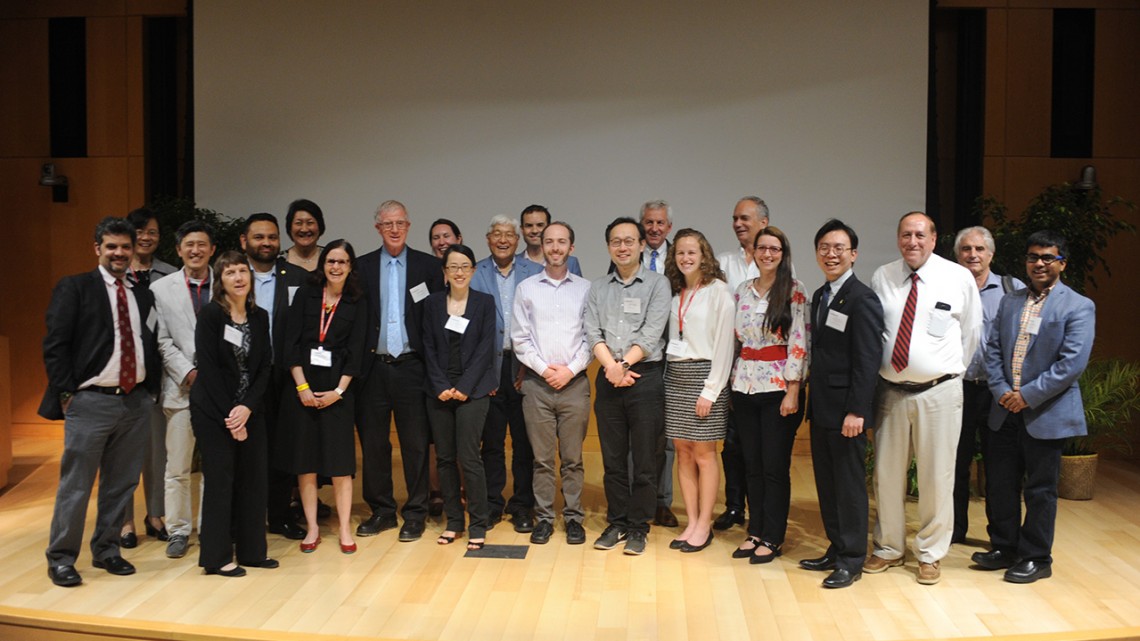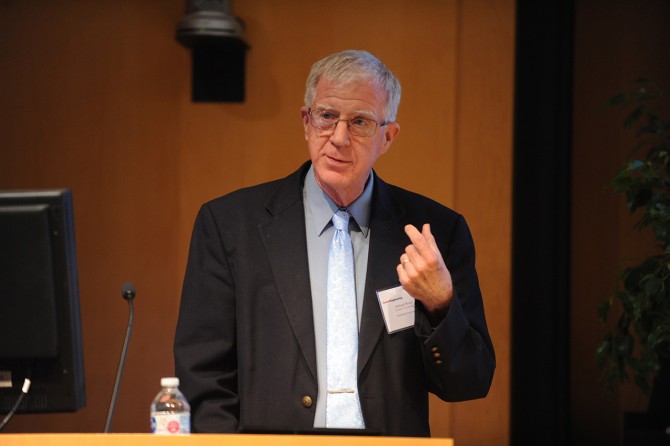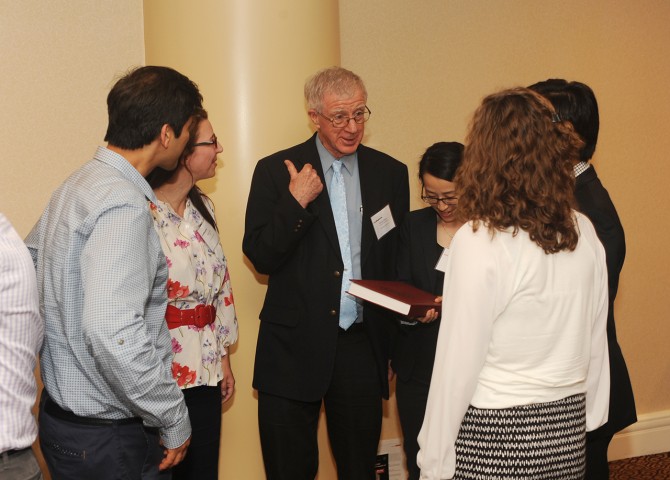
Michael Shuler, eighth from left, the Samuel B. Eckert Professor Emeritus of Engineering, with former students at a symposium honoring his career.
Symposium honors bioengineering pioneer Mike Shuler
By Syl Kacapyr
Scientists from around the world gathered at Cornell on June 22 to honor the career of Professor Michael Shuler, whose work in modeling biological systems continues to revolutionize the field of bioengineering and change the way pharmaceutical drugs are developed and tested.
A daylong symposium hosted in Klarman Hall featured talks from over a dozen academics and industry engineers who discussed how Shuler, who recently received emeritus status as the Samuel B. Eckert Professor of Engineering, changed bioengineering while also serving as a soft-spoken mentor whose guidance was relied upon by many.
When Shuler was hired in 1974 as a professor of chemical engineering at Cornell, he began to apply principles of chemical engineering to understand how cells worked, and he sought to build in vitro systems that could quantitatively simulate biological ones.
“In the earliest days when both biologists and engineers assumed that a living cell was an intractable mess, Mike set out to write down the equations that define its dynamics,” said Abe Stroock, the William C. Hooey Director and Gordon L. Dibble ’50 Professor of Chemical and Biomolecular Engineering. “He used computers that were less powerful than a hand-held calculator today to take a fully chemical-kinetics engineering approach to understanding metabolism and signaling and gene regulation. He was doing systems biology 20 years before that term existed.”
Shuler’s early work at Cornell led to the first chemically accurate mathematical model of an organism, one that could predict the changes in composition, size and shape of a single E. coli cell, as well as the timing of its chromosome synthesis in response to changes in external glucose limitation.
By 1989, Shuler sought to model human organ systems and set out to design a device that could act as a surrogate for real organs. He spent the next 20 years engineering physical models to represent mathematical models of the human body, developing a new set of approaches on tissue engineering, drug discovery and toxicology with his so-called body-on-a-chip, a microfluidic device that can replicate the functions of organs and tissue.
Shuler showed it was possible to co-culture different organ-derived cells on a small, in vitro chip that could then be used to observe the complex responses human organs would have to cancer medication. Until the invention of the body-on-a-chip, animal testing was the only reliable way to achieve the same observations. His work birthed a new field in bioengineering, and today, body-on-a-chip systems are an exciting area of science being explored by many scientists and engineers.
Building a school
At the same time he was pioneering an entirely new area of bioengineering, Shuler was also hard at work laying the foundation for what would one day become a new school at Cornell.
During his time as director of what was then the School of Chemical Engineering, Shuler served on an advisory board that founded the graduate field of biomedical engineering in 1997, spanning five colleges and 11 different departments. The board eventually pushed for a more centralized academic unit that could have a larger impact on the field, calling for a strategic plan to establish a department.
It wasn’t until 2004 that biomedical engineering became a full-fledged department, of which Shuler became the founding chair, a role he would serve in for a decade.
“It wasn’t just his vision, but it was also his perseverance and hard work,” said Marjolein van der Meulen, who succeeded Shuler as the James M. and Marsha McCormick Director of Biomedical Engineering.
In 2015, the department received a $50 million endowment that expanded it as the Nancy E. and Peter C. Meinig School of Biomedical Engineering.
Shuler the mentor
Many of Shuler’s colleagues and former students spoke highly of his influence on them as researchers and as people. The symposium’s keynote speaker, George Georgiou, M.S. ’83, Ph.D. ’87, attributed his success as a researcher and as the chair of the University of Texas at Austin’s engineering program to Shuler’s mentorship.
Georgiou said he learned many lessons from Shuler, including “to believe in your students and to go through great lengths to support them. Mentoring is a great privilege and responsibility.”
While those that know him best said they don’t expect to see Shuler as much on campus, they do look forward to having him remain in one role he has always cherished – as a beloved professional advice giver.
Shuler said he plans to maintain a small research group for at least the next four years to continue two funded research projects. He will also remain active in commercializing his body-on-a-chip technology as president and CEO of the startup company Hesperos Inc.
Other than research, Shuler plans to dedicate more time to his favorite pastime, fishing, and hopes to write a science fiction novel. But above all, he said he looks forward most to spending more time with family.
Syl Kacapyr is public relations and content manager for the College of Engineering.
Media Contact
Get Cornell news delivered right to your inbox.
Subscribe


